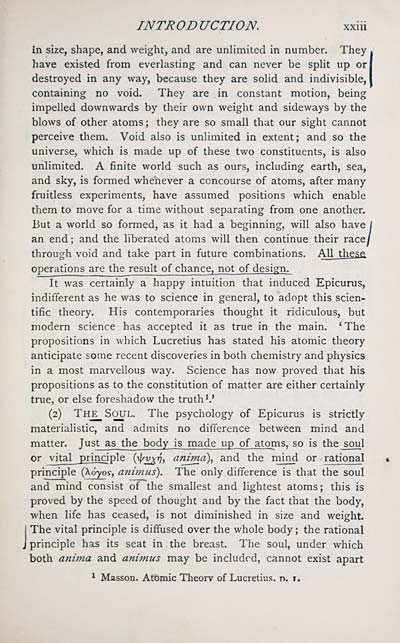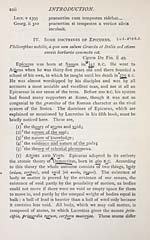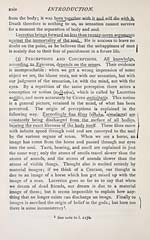Download files
Complete book:
Individual page:
Thumbnail gallery: Grid view | List view

INTRODUCTION. xxiii
in size, shape, and weight, and are unlimited in number. They .
have existed from everlasting and can never be split up orj
destroyed in any way, because they are sohd and indivisible, 1
containing no void. They are in constant motion, being
impelled downwards by their own weight and sideways by the
blows of other atoms ; they are so small that our sight cannot
perceive them. Void also is unlimited in extent; and so the
universe, which is made up of these two constituents, is also
unlimited. A finite world such as ours, including earth, sea,
and sky, is formed whenever a ccncourse of atoms, after many
fruitless experiments, have assumed positions which enable
them to move for a time without separating from one another.
But a world so formed, as it had a beginning, will also have /
an end ; and the liberated atoms will then continue their race/
through void and take part in future combinations. All these
ope rations are t he result of chance, not of design.
It was certainly a happy intuition that induced Epicurus,
indifferent as he was to science in general, to adopt this scien-
tific theory. His contemporaries thought it ridiculous, but
modern science has accepted it as true in the main. 'The
propositions in which Lucretius has stated his atomic theory
anticipate some recent discoveries in both chemistry and physics
in a most marvellous way. Science has now proved that his
propositions as to the constitution of matter are either certainly
true, or else foreshadow the truthV
(2) The_ Soul. The psychology of Epicurus is strictly
materialistic, and admits no difference between mind and
matter. Ju st as the body is made up of atom s, so is the sou l
cr vital _ princi ple {^v^ij, anzma), and the rnind or rational
principle (koyo s, atiimns). The only difference is that the soul
and mind consist oPthe smallest and lightest atoms; this is
proved by the speed of thought and by the fact that the body,
when life has ceased, is not diminished in size and weight
The vital principle is diffused over the whole body ; the rational
principle has its seat in the breast. The soul, under which
both anima and animus may be includrd, cannot exist apart
^ Masson. Atomic Theorv of Lucretius. n. f .
in size, shape, and weight, and are unlimited in number. They .
have existed from everlasting and can never be split up orj
destroyed in any way, because they are sohd and indivisible, 1
containing no void. They are in constant motion, being
impelled downwards by their own weight and sideways by the
blows of other atoms ; they are so small that our sight cannot
perceive them. Void also is unlimited in extent; and so the
universe, which is made up of these two constituents, is also
unlimited. A finite world such as ours, including earth, sea,
and sky, is formed whenever a ccncourse of atoms, after many
fruitless experiments, have assumed positions which enable
them to move for a time without separating from one another.
But a world so formed, as it had a beginning, will also have /
an end ; and the liberated atoms will then continue their race/
through void and take part in future combinations. All these
ope rations are t he result of chance, not of design.
It was certainly a happy intuition that induced Epicurus,
indifferent as he was to science in general, to adopt this scien-
tific theory. His contemporaries thought it ridiculous, but
modern science has accepted it as true in the main. 'The
propositions in which Lucretius has stated his atomic theory
anticipate some recent discoveries in both chemistry and physics
in a most marvellous way. Science has now proved that his
propositions as to the constitution of matter are either certainly
true, or else foreshadow the truthV
(2) The_ Soul. The psychology of Epicurus is strictly
materialistic, and admits no difference between mind and
matter. Ju st as the body is made up of atom s, so is the sou l
cr vital _ princi ple {^v^ij, anzma), and the rnind or rational
principle (koyo s, atiimns). The only difference is that the soul
and mind consist oPthe smallest and lightest atoms; this is
proved by the speed of thought and by the fact that the body,
when life has ceased, is not diminished in size and weight
The vital principle is diffused over the whole body ; the rational
principle has its seat in the breast. The soul, under which
both anima and animus may be includrd, cannot exist apart
^ Masson. Atomic Theorv of Lucretius. n. f .
Set display mode to: Large image | Transcription
Images and transcriptions on this page, including medium image downloads, may be used under the Creative Commons Attribution 4.0 International Licence unless otherwise stated. ![]()
| Early Gaelic Book Collections > Matheson Collection > De rerum natura liber quintus > (27) |
|---|
| Permanent URL | https://digital.nls.uk/76572674 |
|---|
| Description | Items from a collection of 170 volumes relating to Gaelic matters. Mainly philological works in the Celtic and some non-Celtic languages. Some books extensively annotated by Angus Matheson, the first Professor of Celtic at Glasgow University. |
|---|
| Description | Selected items from five 'Special and Named Printed Collections'. Includes books in Gaelic and other Celtic languages, works about the Gaels, their languages, literature, culture and history. |
|---|

